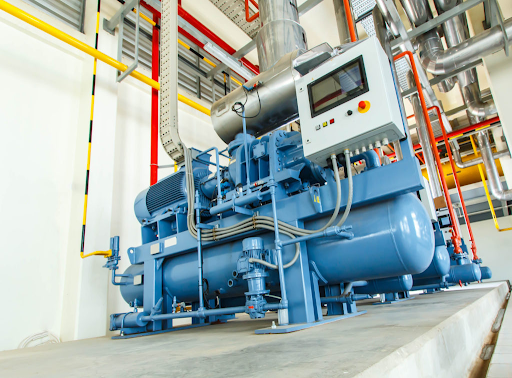Industrial compressors are vital components in many industries, providing the necessary power for manufacturing, processing, and other essential operations. Ensuring their longevity is not only a matter of operational efficiency but also cost-effectiveness. One of the key strategies to extend the life of an industrial compressor is using high-quality parts. Inferior or poorly maintained components can lead to breakdowns, increased energy consumption, and expensive repairs. This article explores how quality parts can contribute to the durability and reliability of industrial compressors, offering insights into maintenance practices and part selection.
The Role of Industrial Compressor Parts in Longevity
The durability and efficiency of an industrial compressor depend significantly on the quality of its components. Compressors operate under high pressure and in demanding environments, making it imperative to use parts designed for optimal performance and durability. High-quality industrial compressor parts, such as filters, valves, gaskets, and seals, contribute to consistent operation and reduce the risk of unexpected failures.
Choosing the right replacement parts from reputable manufacturers ensures compatibility with your system and extends the compressor’s lifespan. Inferior parts can wear out faster, causing operational inefficiencies and leading to costly downtime. Additionally, genuine parts often come with manufacturer warranties, providing added protection against defects and failures.
Importance of Regular Maintenance and Inspections
Routine maintenance is essential to keep industrial compressors in peak condition. Scheduled inspections help detect early signs of wear and tear, preventing minor issues from escalating into major problems. Key maintenance practices include monitoring oil levels, checking for leaks, and ensuring proper lubrication. Regularly replacing air and oil filters prevents contaminants from damaging the internal components, thereby maintaining the compressor’s efficiency.
In addition to routine maintenance, predictive maintenance strategies—such as vibration analysis and thermal imaging—can identify potential failures before they occur. By investing in proactive maintenance and using quality replacement parts, businesses can reduce downtime, enhance efficiency, and extend the operational life of their compressors.
Selecting the Right Parts for Your Industrial Compressor
When replacing compressor parts, it is crucial to select components that meet the specifications and standards of the original equipment manufacturer (OEM). While aftermarket parts may appear cost-effective, they often lack the precision and durability of OEM-certified components. Factors to consider when selecting parts include material quality, compatibility, and manufacturer reputation.
Genuine parts are designed to work seamlessly with specific compressor models, ensuring proper fit and function. Additionally, high-quality materials—such as corrosion-resistant metals and heat-resistant seals—enhance the performance and longevity of the compressor. Investing in quality parts ultimately reduces the frequency of replacements and minimizes the risk of unexpected breakdowns.
Lubrication and Cooling System Maintenance
Lubrication plays a vital role in extending the lifespan of an industrial compressor. Proper lubrication reduces friction, minimizes wear on moving parts, and prevents overheating. Using high-grade lubricants recommended by the manufacturer ensures optimal performance and prevents premature component failure. Regularly changing the oil and monitoring viscosity levels are essential maintenance practices that enhance compressor efficiency.
The cooling system is another critical aspect of compressor longevity. Overheating can cause severe damage to internal components, leading to costly repairs and downtime. Ensuring that the cooling system is functioning correctly—by cleaning heat exchangers, checking coolant levels, and inspecting for blockages—helps maintain the compressor’s operational stability. High-quality cooling system components, such as heat exchangers and thermal sensors, contribute to efficient heat dissipation and prolonged compressor life.
Addressing Common Compressor Issues with Quality Parts
Industrial compressors are subjected to various challenges, including pressure fluctuations, excessive vibrations, and contamination. Addressing these issues promptly with high-quality parts can prevent long-term damage. For instance, using durable seals and gaskets prevents leaks and maintains pressure stability. High-performance bearings reduce vibrations and ensure smooth operation, while advanced filtration systems remove contaminants that could cause internal wear.
Noise reduction is another factor that affects compressor performance. Excessive noise often indicates underlying issues such as loose components or misalignment. Replacing worn-out parts with precision-engineered components minimizes operational noise and enhances overall efficiency.
Cost-Effectiveness of Investing in Quality Parts
While high-quality compressor parts may have a higher initial cost, they offer significant long-term savings by reducing maintenance expenses and preventing costly repairs. Investing in premium parts minimizes the frequency of replacements, enhances energy efficiency, and decreases operational downtime. Businesses that prioritize quality components experience fewer disruptions and lower total cost of ownership.
Additionally, warranties and support from reputable manufacturers provide added value. Many OEM parts come with performance guarantees, ensuring reliability and reducing the risk of unexpected failures. The assurance of quality components contributes to peace of mind and operational stability.
Conclusion
Extending the life of an industrial compressor requires a proactive approach that includes regular maintenance, proper lubrication, and the use of high-quality parts. Choosing OEM-certified components, monitoring system performance, and addressing potential issues promptly contribute to optimal compressor operation. By investing in durable and reliable parts, businesses can enhance efficiency, reduce maintenance costs, and ensure uninterrupted productivity. Prioritizing quality over short-term savings ultimately leads to a more sustainable and cost-effective industrial compressor system.











Leave a Reply